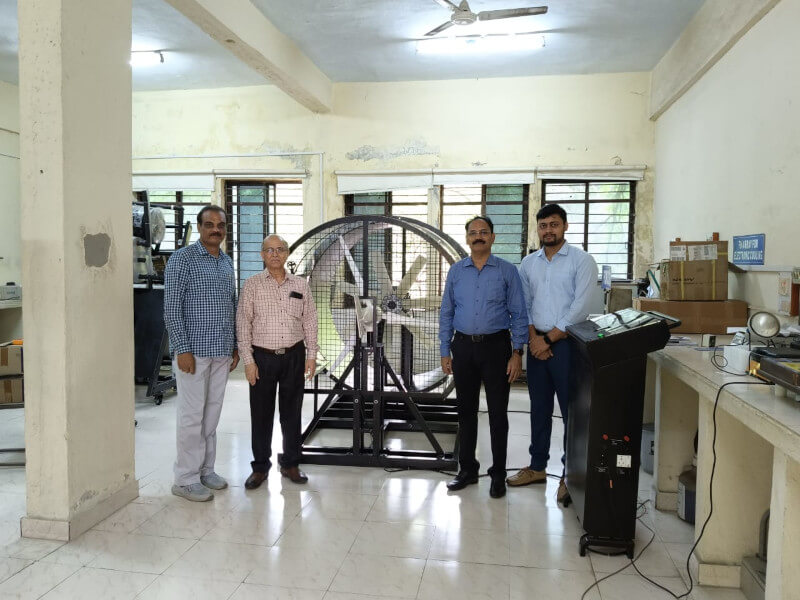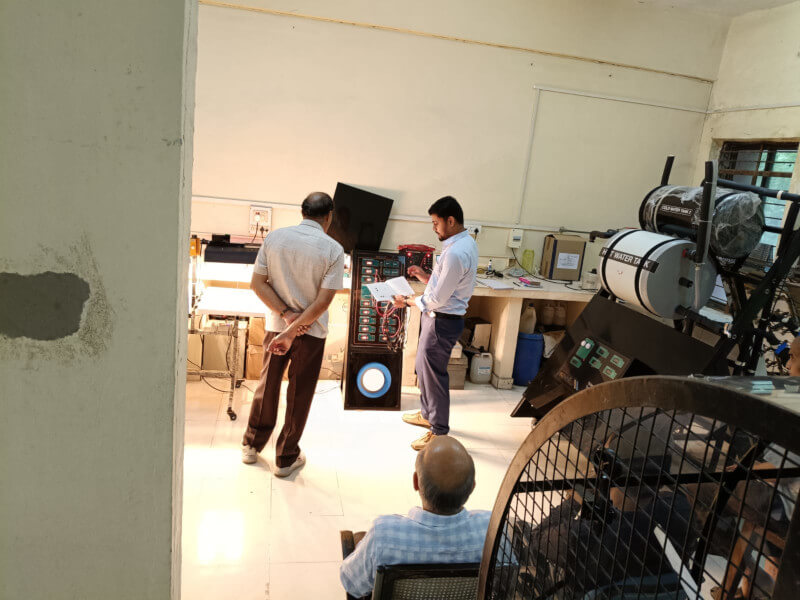In a significant advancement towards enhancing sustainable energy education, Ecosense has installed an innovative Wind Energy Training System and Solar PV Training & Research System at the renowned Jawaharlal Nehru Technological University (JNTU), Hyderabad. This cutting-edge training system is crafted to offer students practical experience and in-depth understanding of solar thermal technology, effectively bridging the gap between academic knowledge and real-world application. As the global focus shifts towards renewable energy solutions, the installation at JNTU Hyderabad represents a pivotal step in preparing future engineers and scientists with the expertise required to spearhead the green energy movement.
Ecosense’s Solar PV Training and Research System
Ecosense’s Solar PV Training and Research System enables users to learn about Solar PV standalone technology. Using this system, a user gains knowledge in three fields of Solar PV Standalone systems:
1) Physics of Solar PV Panels — I-V and P-V characteristics, series, and parallel connection of solar panels effect of irradiation, effect of temperature, effect of shadow, effect of tilting of panels, effect of geographical location etc.
2) Components and Assembly of standalone system — use of blocking diode, use of bypass diode, use of solar charge controller, use of solar inverter, difference between MPPT and PWM charge controllers, AC load, DC load, battery charging/ discharging characteristics, assembly of several components and power flow calculations in each branch.
3) Research in PV systems — Ecosense separately provides a research unit along with a standalone experimental system. Users can initiate research in maximum power point tracking using this unit. It has the provision of providing automatic as well as manual gate signals to charge the controller. Users can use his/ her own MPPT algorithm with any of the controllers to provide manual gate signals.
Technical Benefits of Solar PV Training and Research System
• Incorporates an active measurement panel for precise monitoring of voltages, currents, and temperature
• Allows users to adjust Irradiation levels to mimic varying sunlight conditions, affecting Solar Panel temperature and enabling the study of I-V and P-V characteristics
• Facilitates both Series and Parallel Combination of Solar Panels
• Features an adjustable tilt mechanism for Solar Panels, enabling the examination of the impact of tilt angle on PV module Power
• Includes shading blades for studying the effects of shading on Solar PV
• Encourages hands-on learning by keeping internal connections open, allowing users to practice connecting different components for installing a standalone Solar PV power plant
• Enables power flow calculations for Standalone PV power plants using charge controllers, inverters, A.C. /D.C. loads, and batteries
• Offers the option to provide external gate signals to charge controllers via Function generators, investigating the effects of changes in Duty Cycle on PV Power
• Allows users to input external MPPT signals to study the effects of MPPT algorithms on PV Power
• Provides flexibility for users to implement custom MPPT algorithms to observe their impact on PV Power
• Offers real-time plotting of PV, IV, V vs. time, P vs. time, and I vs. time curves using proprietary PC Software
• Implements the Perturb and Observe MPPT Algorithm
• Utilizes IP 65-protected PV Panels for durability and longevity
• Equipped with a handheld Solar Insolation measuring instrument for accurate solar radiation measurements
• Includes an angle measurement instrument for precise panel positioning
• Data can be saved in CSV format for analysis and record-keeping
• Graphs can be saved in image format for documentation and presentations

Ecosense installed Renewable Energy Lab at JNTU, Hyderabad
Ecosense’s Wind Energy Training System
The Wind Energy Training System is a compact, scaled-down version of an actual wind turbine standalone power plant. It enables users to study the wiring and interconnections of different components involved in the system, offering a foundational understanding of the workings and operation of a standalone wind turbine system. The system includes various experiments that allow students to grasp the underlying principles of wind turbines and their applications in standalone systems.
Key Features of Wind Energy Training System
• Artificial Wind Generator: Utilizes a fan as an artificial wind source, powered by an induction motor whose speed can be controlled via a variable frequency drive (VFD). This allows for indoor usage and controlled wind speed adjustments, crucial for detailed study and experimentation.
• Fixed Pitch Wind Turbine: Operates in a controlled indoor environment, ensuring consistent and safe experimental conditions.
• Active Measurement Panel: Equipped to measure different voltages, currents, wind speed, and RPM, providing real-time data for analysis.
• Certification: The wind turbine is certified by the National Institute of Wind Energy, ensuring reliability and accuracy.
• Handheld Anemometer: Provided for precise wind speed measurements.
• Data Logging and PC Software: Optional software allows for data logging and saving in CSV format, with graphical outputs in image format, facilitating detailed analysis and reporting.

Ecosense installed Renewable Energy Lab at JNTU, Hyderabad
Master’s Training Conducted
After successful installation of system, 2-day master’s training program is conducted. This master’s training was focused on how to efficiently utilize the system in core-curriculum development and practical experimentations.

Ecosense installed Renewable Energy Lab at JNTU, Hyderabad
Glimpses of Demonstration
